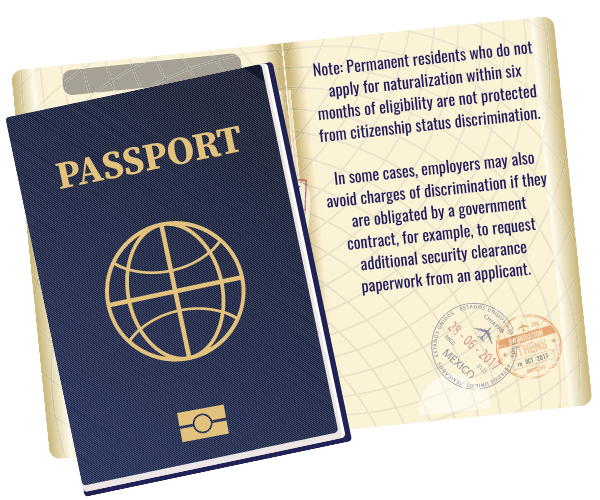When have you crossed the line into immigration status discrimination?
Many employers don’t grasp the subtle difference between national origin discrimination and immigration status discrimination. The former punishes actual ethnicity or area of origin; the latter targets applicants because their current citizenship status makes the employer unlawfully wary of offering them opportunities within the company.
Ask yourself if your company has ever fallen into traps like these:
- A temporary resident with work authorization applies for a job, but they’re immediately passed over because it’s much easier to hire a U.S. citizen than it is to wade into the complex paperwork and legal issues necessary to hire someone else.
- Work authorization papers are requested based only on a vague sense for who might have an immigration status problem; for example, it seems that Asian or Muslim applicants are automatically asked for them, while Caucasians or African-Americans are not.
- You have inadvertently–or maybe intentionally–established a pattern in which U.S. citizens always do certain kinds of jobs, while others in your company wind up doing other things.
The top item on this list is one that especially ensnares employers; the attitude of “I don’t want to wander into that minefield” or “the whole Form I-9 thing is just over my head” can quickly become accepted and pervasive. This discriminatory thinking leaves no paperwork trace, and it’s very easy to justify on the grounds that you’re just avoiding trouble. But you’re only setting yourself up for a lawsuit down the road.
Obey 3 key rules of the IRCA
When you do agree to hire an applicant, remember that the Immigration Reform and Control Act (IRCA) specifically makes it illegal to:
- require more or different documents than are legally acceptable for employment verification purposes.
- refuse to honor the documents the employee offers if they are legally acceptable and appear to be genuine.
- cause intimidation, coercion, threats, or retaliation against individuals who file charges or otherwise cooperate with an investigation, proceeding, or IRCA hearing.
Quiz:
Are your personnel practices discriminating based on immigration status or national origin?

- Do you refuse to consider foreigners for openings at your company?
- Do you tend to dismiss applicants with a foreign accent?
- Do you require a foreign-born applicant to show proof of citizenship or a work visa before making a job offer?
- Do you impose height or weight requirements that have nothing to do with a job’s essential function and that tend to eliminate individuals of a particular national origin?
- Do you require foreign-born applicants to take fluency exams or other tests not given to native-born applicants?
- Do you discourage American workers from applying for certain positions in the belief they will not stay on the job for long?
If you answer “Yes” to any of these questions, you may be in violation of the Immigration Reform and Control Act (IRCA), as well as liable to charges of discrimination under Title VII of the Civil Rights Act.
Careful what you ask for
An employer should not ask about citizenship status during a job interview. All you should do is tell every applicant that in the event of a job offer, they’ll need to provide evidence of a legal entitlement to work within the U.S., and do so within three days.
The IRCA also holds employers liable for unreasonable requests of identification documents. “It’s company policy” is not a valid reason to request to see a green card in addition to a driver’s license and social security card.
This requirement puts employers in a bind: You have to make sure that anyone you hire is in the country legally; however, you are barred from verifying such information during the screening process.
Your safest course of action: As soon as you make your hiring decision, have the new employee fill out an I-9 form. You don’t have to wait for the person’s first day on the job.
Because of court decisions, the Equal Employment Opportunity Commission (EEOC) can no longer order reinstatement or back pay for those discriminated against, but it’s the agency’s declared intention to seek all other forms of relief. Employers should be aware that discriminating against illegal immigrants in terms and conditions of employment can still cause problems with the EEOC. In other words, employers that hire illegal immigrants inadvertently (perhaps because they presented false documentation) can still be taken to task if they discriminate against those workers in the terms and conditions of employment unrelated to their immigrant status.
The ultimate golden rule
Employers are required to treat everyone the same in the hiring process, disregarding factors like appearance, accent, how a name sounds, or someone’s citizenship status. This applies from the time you post a position throughout the application and interview process, and extends into the offering of a job and the subsequent establishment of eligibility via the Form I-9 or E-Verify process.






